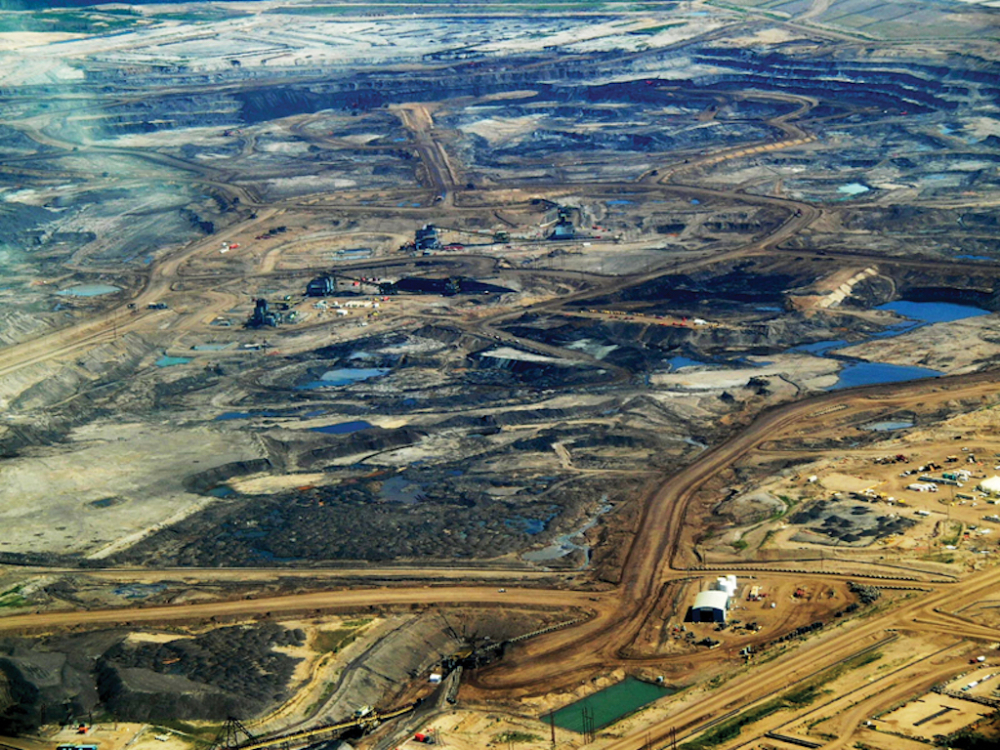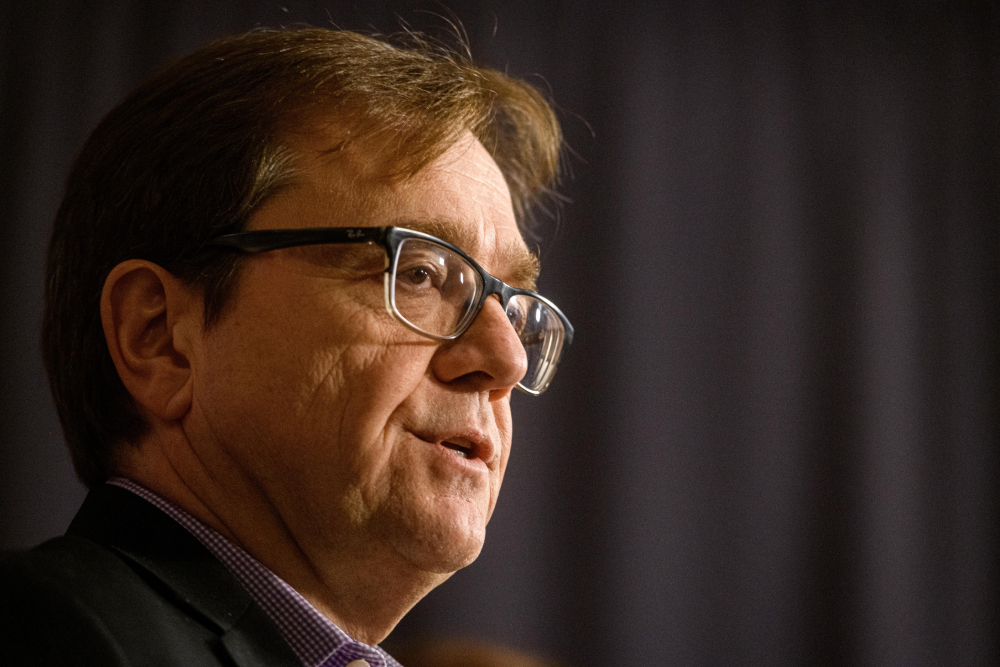The Trudeau government is under intense scrutiny for a looming decision — one that will powerfully signal whether it favours oil patch growth over fighting the climate emergency.
Will the Liberals approve a new bitumen mine twice the size of Vancouver that alone is expected to add 20 per cent of additional oilsands emissions over the next three decades?
Or will Justin Trudeau’s government make good on its promise to set Canada on the path to having “net-zero” emissions by 2050 by rejecting the Frontier mine being proposed by Vancouver-based Teck Resources?
Federal Environment and Climate Change Minister Jonathan Wilkinson, who represents the riding of North Vancouver, is reportedly "wrestling" with the decision, which is expected sometime next month. The Prime Minister’s Office didn’t respond to The Tyee’s interview request.
Wilkinson has said that achieving Canada’s aggressive net-zero target, which would result in the country effectively ceasing to contribute to global temperature rise within three decades, is not open to negotiation: “That is a target that is not informed by politics. It’s informed by science.”
If that’s the case, then the Liberals need to forcefully reject what is one of the biggest oilsands mining projects ever proposed, says Eriel Deranger, executive director of the Edmonton-based group Indigenous Climate Action. “We cannot afford more destabilization of critical ecosystems and the creation of massive amounts of carbon emissions,” she told The Tyee.
A Liberal decision to approve the $20.6-billion Teck Resources Frontier mine could make it impossible to achieve the government’s long-term climate targets — not to mention the near-term Paris agreement targets Canada is already on track to miss because of oilsands emissions.
“The Frontier mine, if constructed, would emit four to six megatonnes of greenhouse gases annually until 2066, meaning the net-zero by 2050 target would be blown out of the water,” said Catherine Abreu, executive director of the Climate Action Network Canada. “If this project is approved, I think it will dramatically undermine their credibility on this issue.”
Teck Resources has been a coal mining giant, only recently pivoting to oilsands aspirations. The company, which has been fined millions of dollars for pollution violations, suggested to The Tyee in an email that Frontier is not the climate threat critics make it out to be. It says the project will comply with federal conditions setting out annual limits on its greenhouse gas footprint.
“Teck is committed to advancing the Frontier project forward in a socially and environmentally responsible manner and we support the efforts by government to combat climate change,” the email reads.
The looming Liberal decision is the final regulatory hurdle Teck has to clear before being able to build Frontier. A federal-provincial review panel last year determined that the $70 billion in government revenues Frontier could potentially generate outweighed the destruction of thousands of hectares of old-growth forest, wood bison habitat, climate sequestering wetlands and other “significant adverse environmental effects.”
Yet in making that assessment the panel appeared to uncritically accept Teck’s projection that oil prices will average $95 per barrel in coming years, an assumption that even the mining company no longer seems to support. In a presentation to investors last month, it said that a lower price of $60 to $70 per barrel is more likely.
“Therefore, the [joint review panel] based its decision on a highly misleading financial forecast,” reads a report released this week from the Institute for Energy Economics and Financial Analysis. “It conferred upon Teck Resources significant development rights for a project with poor financial prospects that will have adverse consequences for taxpayers and the environment.”
Teck disputes the financial risks. “Frontier has the potential to deliver significant value over the course of a 40-plus year mine life, operating through multiple price cycles and remaining economic at a range of oil prices,” it wrote.

The brain trust of the Globe and Mail newspaper doubts the project is viable, even as it backs it. “We believe the Trudeau government should give its approval,” reads an editorial published three days before Christmas. “We also believe that, even after approval is granted, Frontier is likely to remain unbuilt, possibly forever. It’s a megaproject that doesn’t appear to make business sense, absent higher oil prices.”
Alberta Premier Jason Kenney is nonetheless pitching the mine as “a wealth bomb ready to detonate.” In Ottawa last month he claimed, “If this project does not proceed, it would be a clear indication that there is no way forward for this country’s largest natural resource.”
However, even advocates of oilsands expansion question whether Kenney should be supporting Frontier.
University of Alberta economist Andrew Leach, who held the Enbridge professorship in energy policy, chaired the previous government’s Climate Change Advisory Panel, and supports the TMX pipeline expansion, crunched the numbers and concludes the Frontier mine is too financially risky to approve compared to “plenty of other potential [oilsands] investments with lower costs than Frontier.”
“Why would the Alberta government be so damned stupid as to propose another surface mine in the oilsands,” wrote Edmonton Sun columnist Graham Hicks earlier this month. “No matter the science, the optics stink. Yet another vast, oily, tailings pond, huge intrusions into Mother Earth, vast disruptions of the beaver, the fox, the bear and the caribou. All the oilsands stuff that the Rest of Canada hates... and many Albertans are equally uneasy about.”
That makes it an increasingly high-profile target for Canada’s climate movement. Prominent climate activist Tzeporah Berman attacked the project in a Guardian op-ed, arguing that an approval “would effectively signal Canada’s abandonment of its international climate goals.”
Indigenous Climate Action meanwhile held a protest against Frontier during the Madrid climate talks in December. The project has conditional, although perhaps tenuous, support from 14 First Nations and Metis communities.
Indigenous Climate Action’s Deranger said those communities are likely trying to gain whatever economic benefits they can from an oilsands industry that has already massively disrupted their way of life. “The only option for having their voices and concerns heard and being compensated for the impacts,” she said, “is through signing these deals.”
That in no way changes the fact that “we need to be moving towards the phase-out of fossil fuels,” Deranger added. If the Liberals are truly serious about wanting to fix the climate emergency, not to mention their commitments to reconciliation, she explained, they would reject Frontier and support a massive job-creating transition away from fossil fuels.
That could include, as The Tyee has reported, redirecting government subsidies for oil and gas into postsecondary education for indigenous peoples and committing to fully implementing the United Nations Declaration on the Rights of Indigenous Peoples.
“That doesn’t happen when we continue to approve new projects,” Deranger said.
Abreu of the Climate Action Network agrees that this is the opportunity to take the country in a much less ecologically destructive direction. With wildfires roaring through Australia, Indonesia submerged in catastrophic floods, Canada warming twice as fast as the rest of the world and climate disasters expected to get worse and worse, she argued, the federal Liberals can back projects that make the emergency worse or show the leadership necessary to build an economy no longer reliant on oil and gas production.
“Canada needs to choose what path it’s going to take,” she said. ![]()
Read more: Energy, Federal Politics, Environment
















Tyee Commenting Guidelines
Comments that violate guidelines risk being deleted, and violations may result in a temporary or permanent user ban. Maintain the spirit of good conversation to stay in the discussion.
*Please note The Tyee is not a forum for spreading misinformation about COVID-19, denying its existence or minimizing its risk to public health.
Do:
Do not: